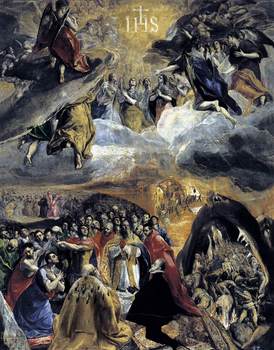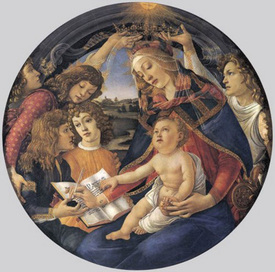 May my mouth speak the praise of the Lord, and may all flesh bless his holy name forever and ever, alleluia.
May my mouth speak the praise of the Lord, and may all flesh bless his holy name forever and ever, alleluia.
Tag: Holy Name of Jesus
Saint John of Capistrano
 They sang, O Lord, Your holy name and praised in unison Your conquering hand.
They sang, O Lord, Your holy name and praised in unison Your conquering hand.
Saint Bernardine of Siena
 No other name under heaven has been given to men by which we can be saved.
No other name under heaven has been given to men by which we can be saved.
Father, You gave Saint Bernardine a special love for the holy name of Jesus. By the help of his prayers, may we always be alive with the spirit of your love.
Many people think the IHS symbol originated with and belongs exclusively with the Society of Jesus. The typical Jesuit use of IHS is slightly different from the one used by Bernardine in that the 3 nails are included in the Jesuit monogram. Historically the IHS is an ancient symbol and it was popularized by today’s Saint Bernardine of Siena, the Apostle of Italy or alternatively called the Apostle of the Holy Name.
As a monograph for the name of Jesus Christ it became more popular after the 12th century. We know that Saint Bernard of Clairvaux had a devotion to the Holy Name of Jesus as well as other notable other churchmen and women. Let’s remember that Bernardine suffered great opposition at the hands of the Church for his use devotion and propagation of the Name of Jesus because it was seen as idolatry. By 1530, the Church approved of the Mass text for the feast of the Triumph of the Holy Name of Jesus, celebrated today on January 3, restored to the Roman Missal by Pope John Paul II in 2002. Moreover, there is a long tradition of celebrating the second Sunday of each month as Holy Name Sunday (we did so growing up at St. Stanislaus Church, New Haven, CT).
I would like to recommend membership in The Holy Name Society
One Saint Bernardine’s famous homilies:
 The name of Jesus is the glory of preachers, because the shining splendor of that name causes his word to be proclaimed and heard. And how do you think such an immense, sudden and dazzling light of faith came into the world, if not because Jesus was preached? Was it not through the brilliance and sweet savor of this name that God called us into his marvelous light? When we have been enlightened, and in that same light behold the light of heaven, rightly may the apostle Paul say to us: Once you were darkness, but now you are light in the Lord; walk as children of light.
The name of Jesus is the glory of preachers, because the shining splendor of that name causes his word to be proclaimed and heard. And how do you think such an immense, sudden and dazzling light of faith came into the world, if not because Jesus was preached? Was it not through the brilliance and sweet savor of this name that God called us into his marvelous light? When we have been enlightened, and in that same light behold the light of heaven, rightly may the apostle Paul say to us: Once you were darkness, but now you are light in the Lord; walk as children of light.
So this name must be proclaimed, that it may shine out and never be suppressed. But it must not be preached by someone with sullied mind or unclean lips, but stored up and poured out from a chosen vessel. That is why our Lord said of Saint Paul: He is a chosen instrument of mine, the vessel of my choice, to carry my name before the Gentiles and kings and the sons of Israel. In this chosen vessel there was to be a drink more pleasing than earth ever knew, offered to all mankind for a price they could pay, so that they would be drawn to taste of it. Poured into other chosen vessels, it would grow and radiate splendor. For our Lord said: He is to carry my name.
When a fire is lit to clear a field, it burns off all the dry and useless weeds and thorns. When the sun rises and darkness is dispelled, robbers, night-prowlers and burglars hide away. So when Paul’s voice was raised to preach the Gospel to the nations, like a great clap of thunder in the sky,
his preaching was a blazing fire carrying all before it. It was the sun rising in full glory. Infidelity was consumed by it, false beliefs fled away, and the truth appeared like a great candle lighting the whole world with its brilliant flame.
By word of mouth, by letters, by miracles and by the example of his own life, Saint Paul bore the name of Jesus wherever he went. He praised the name of Jesus at all times, but never more than when bearing witness to his faith. Moreover, the Apostle did indeed carry this name before the Gentiles and kings and the sons of Israel as a light to enlighten all nations. And this was his cry wherever he journeyed: The night is passing away, the day is at hand. Let us then cast off the works of darkness and put on the armor of light; let us conduct ourselves honorably as in the day. Paul himself showed forth the burning and shining light set upon a candlestick, everywhere proclaiming Jesus, and him crucified.
And so the Church, the bride of Christ strengthened by his testimony, rejoices with the psalmist, singing: “God, from my youth you have taught me, and I still proclaim your wondrous deeds. The psalmist exhorts her to do this, as he says: Sing to the Lord, and bless his name, proclaim his
salvation day after day. And this salvation is Jesus, her savior.”
From a sermon by Saint Bernardine of Siena
Sermo 49, De glorioso Nomine Iesu Christi, cap 2: Opera omnia, 4. 505-506
The name of Jesus is light, food, power
Saint Bernard of Clairvaux offers a power witness to the name of Jesus. Today’s feast of the Holy Name of Jesus is a good time to consider the words of Bernard as food for the soul.
I recognize now the name hinted at by Isaiah: “My servants are to be given a new name. Whoever is blessed on earth in that name will be blessed by the Lord, Amen.” O blessed name, oil poured out without limit! From heaven it pours down on Judaea and from there over all the earth, so that round the whole world the Church proclaims: “Your name is oil poured out.” And what an outpouring! It not only bathes the heavens and the earth, it even bedews the underworld, so that all beings in the heavens and the earth, it even bedews the underworld should bend the knee in the name of Jesus, and that every tongue should
 acclaim: “Your name is oil poured out.” Take the name of Christ, take the name of Jesus; both were infused into the angels, both were poured our upon men, even upon men who rotted like animals in their own dung. Thus you became a savior both of men and beasts, so countless are your mercies, O God. How precious your name, and yet how cheap! Cheap, but the instrument of salvation. If it were not cheap it would not have been poured out for me; if it lacked saving power it would not have won me. Made a sharer in the name, I share too in its inheritance. For I am a Christian, Christ’s own brother. If I am what I say, I am the heir of God, co-heir with Christ. And what wonder if the name of the Bridegroom is poured out, since he himself is pour out? For he emptied himself to assume the condition of a slave.
acclaim: “Your name is oil poured out.” Take the name of Christ, take the name of Jesus; both were infused into the angels, both were poured our upon men, even upon men who rotted like animals in their own dung. Thus you became a savior both of men and beasts, so countless are your mercies, O God. How precious your name, and yet how cheap! Cheap, but the instrument of salvation. If it were not cheap it would not have been poured out for me; if it lacked saving power it would not have won me. Made a sharer in the name, I share too in its inheritance. For I am a Christian, Christ’s own brother. If I am what I say, I am the heir of God, co-heir with Christ. And what wonder if the name of the Bridegroom is poured out, since he himself is pour out? For he emptied himself to assume the condition of a slave.
Did he not even say: “I am pour out like water”? The fullness of the divine life was poured out and lived on earth in bodily form, that all of us who live in this body doomed to death may receive from that fullness, and being filled with its life-giving odor say: “Your name is oil poured out.” Such is what is meant by the outpouring of the name, such its manner, such its extent.
By why the symbol of oil? I have yet to explain this. In the previous sermon I had begun to do so when another matter that seemed to demand mention suddenly presented itself, though I may have dallied with it longer than I intended. In this I resembled the valiant woman, Wisdom, who put her hand to the distaff, her fingers to the spindle. Skillfully she produced from her scanty stock of wool or flax a long spool of thread, out of which she wove the material that made warm clothes for the members of her household. The likeness between oil and the name of the Bridegroom is beyond doubt, the Holy Spirit’s comparison of the two is no arbitrary gesture. Unless you can persuade me otherwise, I hold that the likeness is to be found in the threefold property of oil: it gives light, it nourishes, it anoints. It feeds the flame, it nourishes the body, relieves pain: it is light, food, medicine. And is not this true too of the Bridegroom’s name? When preached it gives light, when meditated it nourishes, when invoked it relieves and soothes.
How shall we explain the world-wide light of faith, swift and flaming in its progress, except by the preaching of Jesus’ name? Is it not by light of this name that God has called us into his wonderful light, that irradiates our darkness and empowers us to see the light? To such as we Paul says: “You were darkness once, but now you are light in the Lord.” This is the name that Paul was commanded to present before kings and pagans and the people of Israel; a name that illumined his native land as he carried it with him like a torch, preaching on all his journeys that the night is almost over, it will be daylight soon -let us give up all the things we prefer to do under cover of the dark; let us arm ourselves and appear in the light. Let us live decently as people do in the daytime. To every eye he was a lamp on its lamp-stand; to every place he brought the good news of Jesus, him crucified. What splendor radiated from that light, dazzling the eyes of the crowd, when Peter uttered the name of the strengthened the feet and ankles of the cripple, and gave light to many eyes that were spiritually blind. Did not the words shoot like a flame when he said: “In the name of Jesus Christ of Nazareth, arise and walk”? But the name of Jesus is more than light, it is also food. Do you not feel increase of strength as often as you remember it? What other name can enrich man who meditates? What can equal its power to refresh the harassed senses, to buttress the virtues, to add vigor to good and upright habits, to foster chaste affections? Every food of the mind is dry if it is not dipped in that oil; it is tasteless if not seasoned by that salt. Write what you will, I shall not relish it unless it tells of Jesus. Talk or argue about what you will, I shall not relish it if you exclude the name of Jesus. Jesus to me is honey in the mouth, music in ear, a song in the heart.
Saint Bernard of Clairvaux
Sermon 15 on the Song of Songs.
Holy Name of Jesus
 Lord, may we honor the Holy Name of Jesus enjoy His friendship in this life and be filled with eternal joy in His Kingdom, where He lives and reigns with You and the Holy Spirit, one God, for ever and ever.
Lord, may we honor the Holy Name of Jesus enjoy His friendship in this life and be filled with eternal joy in His Kingdom, where He lives and reigns with You and the Holy Spirit, one God, for ever and ever.
Jesu Dulcis Memoria
Jesu, the very thought of thee
With sweetness fills my breast;
But sweeter far thy face to see,
And in thy presence rest!
Nor voice can sing, nor heart can frame,
Nor can the memory find
A sweeter sound than thy blest name,
O Savior of mankind!
O hope of every contrite heart!
O joy of all the meek!
To those who fall, how kind thou art,
How good to those who seek!
But what to those who find? Ah this
Nor tongue nor pen can show:
The love of Jesus, what it is,
None but his lovers know.
O Jesu, light of all below!
Thou Fount of life and fire!
Surpassing all the joys we know,
And all we can desire!
Thee will I seek, at home, abroad,
Who everywhere art nigh;
Thee in my bosom’s cell, O Lord,
As on my bed I lie.
With Mary to thy tomb, I’ll haste,
Before the dawning skies,
And all around with longing cast
My soul’s inquiring eyes;
Beside thy grave will make my moan,
And sob my heart away;
Then at thy feet sink trembling down,
And there adoring stay;
Nor from my tears and sighs refrain,
Nor those dear feet release,
My Jesu, still from thee I gain
Some blessed word of peace!
A Vespers hymn by Saint Bernard of Clairvaux (12th century)
The feast of the Holy Name of Jesus has been celebrated in various places since the fifteenth century and was extended to the whole Catholic Church 20 December 1721 by Pope Innocent XIII but it was a devotion of many holy men and women before this time. There are antecedents which indicate that the faithful’s veneration of the Holy Name was encouraged Saint Bernard of Clairvaux, Saint Bernardine of Siena and Saint John Capistrano. Various religious orders had their dates for the observance of this feast. Sadly, one of the reforms of the Second Vatican Council was to excise the feast from the liturgical calendar thinking that the Holy name was honored enough in the Divine Office and that the Mass texts were reduced to a Votive Mass. When Pope John Paul II published the third edition of the Roman Missal in 2002 he restored the feast to the liturgical calendar as an optional memorial on the first free day after January 1st, that is January 3rd.
 By the time of Saint Ignatius of Loyola and his companions, the newly of priests chose the name of Jesus by which they would identify themselves. With the pope’s permission the Loyola called his groups the Company of Jesus, translated into Latin to be the Societas Iesus, hence the Society of Jesus. The image adopted was Saint Bernardine’s IHS monogram. The observance of the feast of the Holy Name of Jesus, with its Votive Mass, set the tone of mission of the Company of Jesus. As a side note, the Votive Mass of the Holy Name of Jesus was one the Masses offered for the repose of the soul of Avery Cardinal Dulles at the University Chapel at Fordham. The devotion still is observed in the Society of Jesus.
By the time of Saint Ignatius of Loyola and his companions, the newly of priests chose the name of Jesus by which they would identify themselves. With the pope’s permission the Loyola called his groups the Company of Jesus, translated into Latin to be the Societas Iesus, hence the Society of Jesus. The image adopted was Saint Bernardine’s IHS monogram. The observance of the feast of the Holy Name of Jesus, with its Votive Mass, set the tone of mission of the Company of Jesus. As a side note, the Votive Mass of the Holy Name of Jesus was one the Masses offered for the repose of the soul of Avery Cardinal Dulles at the University Chapel at Fordham. The devotion still is observed in the Society of Jesus.
Does your parish have a Holy Name Society? If not, why not ask the pastor to begin one. See the US confraternity’s webpage.